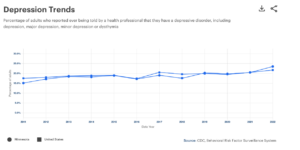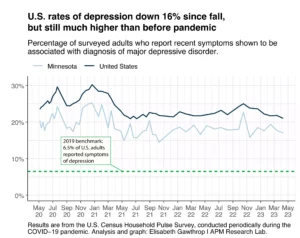
The land of 10,000 lakes isn’t immune to the rising tide of mental health challenges sweeping across the nation. In recent years, there has been growing concern about the increasing prevalence of depression here in the United States and globally. As providers dedicated to the well-being of our community, we must examine the question: Are there rising depression rates in Minnesota, and what can we at ACP do to help?
Understanding Depression: A Complex Landscape
Depression, an increasingly common mood disorder, affects millions of people worldwide. It’s a multifaceted condition influenced by a myriad of factors, including genetic predisposition, environmental stressors, socio-economic status, and access to mental health resources.
Examining the Minnesota Context
The conversation surrounding mental health has gained momentum in recent years. Initiatives to reduce stigma, increase awareness, and improve access to mental health services have been implemented across the state. However, despite these efforts, the prevalence of depression remains a pressing concern.
According to data from the Centers for Disease Control and Prevention (CDC), the percentage of adults in Minnesota who’ve been diagnosed with a depressive disorder has gone from 15.1% in 2011 to 23.5% in 2022. That doesn’t factor in youth, who are increasingly facing long-term mental health issues.

While factors like long and dark winters have always been a part of Minnesota life, more recent influences, including economic uncertainties, social justice issues, and the lingering impacts of the COVID-19 pandemic, have contributed to heightened levels of stress and anxiety here in our home state.
While we started to see depression rates in Minnesota fall in 2023, they’re still significantly higher than they were before the pandemic. That means there’s lots of work to be done.

The Role of Awareness and Intervention
Depression is a treatable condition. As mental health professionals, our focus lies not only on identifying the problem but also on implementing effective solutions. By fostering a culture of empathy, understanding, and open communication, we can dismantle the barriers that prevent individuals from finding a therapist and seeking help.
“In 2021, only 47.2% of Americans with any mental illness received mental health services in the past year” (National Institute of Mental Health).
At ACP, we want to be part of changing that statistic. We offer comprehensive, evidence-based care to individuals struggling with depression, anxiety, and other mental health issues. Through therapy, psychiatric services, and other interventions, we empower our clients to navigate their mental health challenges in a healthy and holistic way.
We also recognize the importance of community involvement and collaboration in addressing the root causes of depression. By partnering with local organizations, schools, and healthcare providers in our community-based programming, we can expand access to mental health resources and promote well-being across Minnesota and into western Wisconsin.
Moving Forward: Hope on the Horizon
With a culture of compassion and a passion for destigmatizing mental illness, we can build a healthier, more resilient Minnesota—one where mental health is prioritized and every individual has the support they need to thrive. If you or someone you know is struggling with depression, please don’t hesitate to reach out for help. You are not alone, and support is available.

